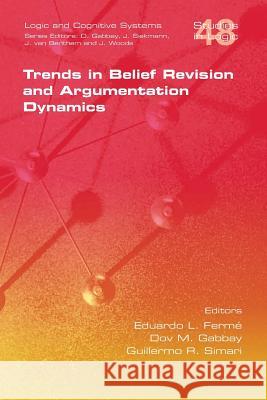Trends in Belief Revision and Argumentation Dynamics » książka
Trends in Belief Revision and Argumentation Dynamics
ISBN-13: 9781848900653 / Angielski / Miękka / 2013 / 316 str.
Trends in Belief Revision and Argumentation Dynamics contains a collection of original essays on diverse aspects where these two areas of research converge. The essays are the result of the synergistic interactions that took place during the 2012 Workshop on Belief Revision and Argumentation in Funchal, Madeira. The Island of Madeira provided a stimulating environment for the presentation of research results and the subsequent lively discussions held. The dynamic exchange of ideas contributed to refining the approaches and to discovering new insights that undoubtedly will positively affect the field by advancing the individual research lines. The authors of the chapters in this book have made an effort to reflect these discussions, successfully addressing many of the important points raised during the workshop. The present book encompasses work that comes from the two areas of research, which are different but that are concerned with the epistemic state of an agent. As such, these essays reflect dissimilar perspectives that have contributed to advance the understanding of such a puzzling and thrilling problem. At the same time, with this collection we hope to reach a wider audience by disseminating and stimulating research on this topic, as we strongly believe that the interaction between the two areas will lead to a better understanding of each of them.
Trends in Belief Revision and Argumentation Dynamics contains a collection of original essays on diverse aspects where these two areas of research converge. The essays are the result of the synergistic interactions that took place during the 2012 Workshop on Belief Revision and Argumentation in Funchal, Madeira. The Island of Madeira provided a stimulating environment for the presentation of research results and the subsequent lively discussions held. The dynamic exchange of ideas contributed to refining the approaches and to discovering new insights that undoubtedly will positively affect the field by advancing the individual research lines. The authors of the chapters in this book have made an effort to reflect these discussions, successfully addressing many of the important points raised during the workshop. The present book encompasses work that comes from the two areas of research, which are different but that are concerned with the epistemic state of an agent. As such, these essays reflect dissimilar perspectives that have contributed to advance the understanding of such a puzzling and thrilling problem. At the same time, with this collection we hope to reach a wider audience by disseminating and stimulating research on this topic, as we strongly believe that the interaction between the two areas will lead to a better understanding of each of them.











